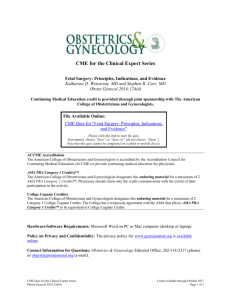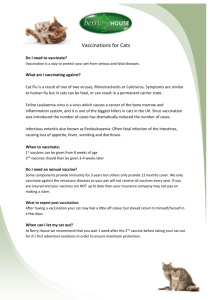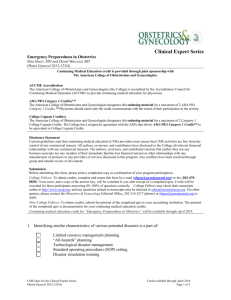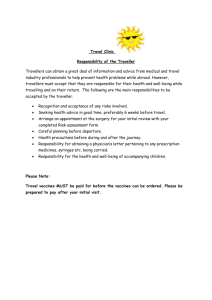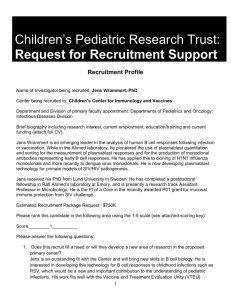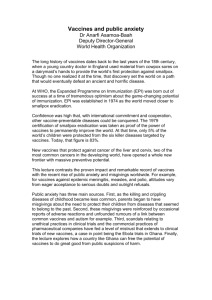Vaccinations for Pregnant Women
advertisement
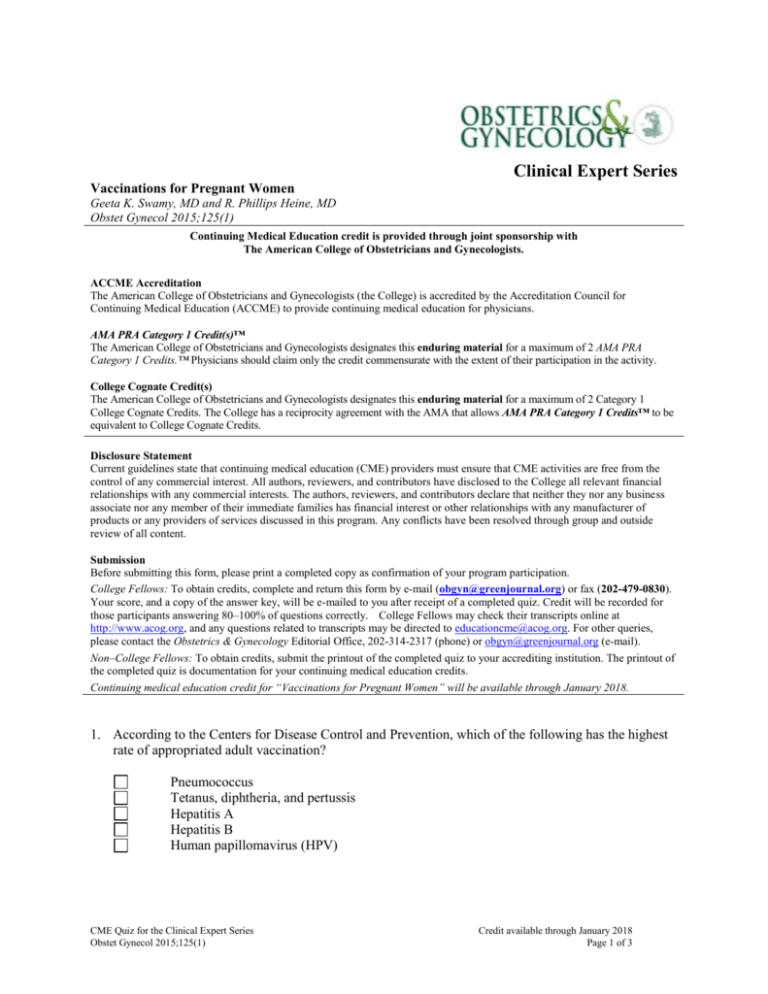
Clinical Expert Series Vaccinations for Pregnant Women Geeta K. Swamy, MD and R. Phillips Heine, MD Obstet Gynecol 2015;125(1) Continuing Medical Education credit is provided through joint sponsorship with The American College of Obstetricians and Gynecologists. ACCME Accreditation The American College of Obstetricians and Gynecologists (the College) is accredited by the Accreditation Council for Continuing Medical Education (ACCME) to provide continuing medical education for physicians. AMA PRA Category 1 Credit(s)™ The American College of Obstetricians and Gynecologists designates this enduring material for a maximum of 2 AMA PRA Category 1 Credits.™ Physicians should claim only the credit commensurate with the extent of their participation in the activity. College Cognate Credit(s) The American College of Obstetricians and Gynecologists designates this enduring material for a maximum of 2 Category 1 College Cognate Credits. The College has a reciprocity agreement with the AMA that allows AMA PRA Category 1 Credits™ to be equivalent to College Cognate Credits. Disclosure Statement Current guidelines state that continuing medical education (CME) providers must ensure that CME activities are free from the control of any commercial interest. All authors, reviewers, and contributors have disclosed to the College all relevant financial relationships with any commercial interests. The authors, reviewers, and contributors declare that neither they nor any business associate nor any member of their immediate families has financial interest or other relationships with any manufacturer of products or any providers of services discussed in this program. Any conflicts have been resolved through group and outside review of all content. Submission Before submitting this form, please print a completed copy as confirmation of your program participation. College Fellows: To obtain credits, complete and return this form by e-mail (obgyn@greenjournal.org) or fax (202-479-0830). Your score, and a copy of the answer key, will be e-mailed to you after receipt of a completed quiz. Credit will be recorded for those participants answering 80–100% of questions correctly. College Fellows may check their transcripts online at http://www.acog.org, and any questions related to transcripts may be directed to educationcme@acog.org. For other queries, please contact the Obstetrics & Gynecology Editorial Office, 202-314-2317 (phone) or obgyn@greenjournal.org (e-mail). Non–College Fellows: To obtain credits, submit the printout of the completed quiz to your accrediting institution. The printout of the completed quiz is documentation for your continuing medical education credits. Continuing medical education credit for “Vaccinations for Pregnant Women” will be available through January 2018. 1. According to the Centers for Disease Control and Prevention, which of the following has the highest rate of appropriated adult vaccination? Pneumococcus Tetanus, diphtheria, and pertussis Hepatitis A Hepatitis B Human papillomavirus (HPV) CME Quiz for the Clinical Expert Series Obstet Gynecol 2015;125(1) Credit available through January 2018 Page 1 of 3 2. Maternal immunization during pregnancy carries the additional benefit of: Lower vaccine dosage Reduced vaccine-related side effects Improved level of insurance reimbursement Enhanced immune response for the mother Passive immunity for the fetus 3. Antenatal surveillance and postpartum vaccination has resulted in the near eradication of: Fetal herpetic encephalitis Infantile diphtheria Congenital mumps Group B staphylococcus Congenital rubella 4. The greatest immune response is generated by immunization with: Subunit vaccines Conjugated vaccines Inactivated vaccines Toxoid vaccines Live attenuated vaccines 5. Multiple dosing, booster dosing, or both to maintain adequate serologic protection are typical of which of the following vaccines? Subunit vaccines Conjugated vaccines Inactivated vaccines Toxoid vaccines Live attenuated vaccines 6. Which form of vaccine is generally contraindicated during pregnancy? Subunit vaccines Conjugated vaccines Inactivated vaccines Toxoid vaccines Live attenuated vaccines CME Quiz for the Clinical Expert Series Obstet Gynecol 2015;125(1) Credit available through January 2018 Page 2 of 3 7. The factor most closely associated with significant morbidity resulting from influenza infection during pregnancy is: Infection with type A serotype Maternal age less than 25 years Gestational age Zanamivir resistance Delay in treatment 8. Current tetanus toxoid, reduced diphtheria toxoid, and acellular pertussis (Tdap) vaccination strategies to prevent infantile pertussis suggest that the optimal time for vaccination is: Paternal vaccination prior to pregnancy Maternal vaccination in the first trimester Maternal vaccination in the third trimester Infant vaccination at birth Infant vaccination at 3 months of age 9. When the measles, mumps, rubella (MMR) vaccine is given to women of reproductive age, they should be advised to avoid pregnancy for at least: 1 week 2 weeks 4 weeks 6 weeks 8 weeks 10. A pregnant patient is found to lack immunity to rubella. She is planning to breastfeed. The most appropriate management for this patient is to advise her to be immunized following delivery and: Discontinue breastfeeding completely Discontinue breastfeeding for 3 months Discontinue breastfeeding for 6 weeks Discontinue breastfeeding for 10 days Breastfeed normally College ID Number: Name: Address: City/State/Zip: E-mail Address: Actual time spent completing this activity (you may record up to 2 hours): CME Quiz for the Clinical Expert Series Obstet Gynecol 2015;125(1) Credit available through January 2018 Page 3 of 3
